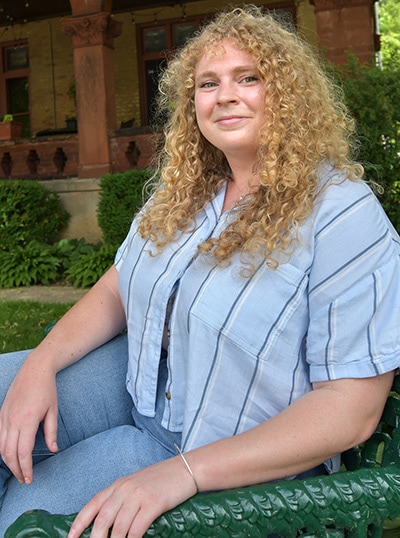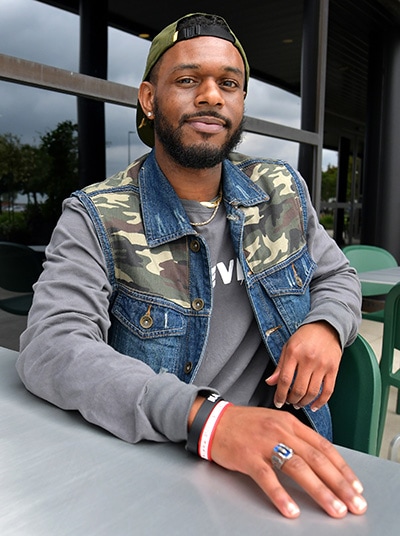When I set out to write this story, I wanted to write a piece about transitioning out of formal education and into the workforce, while addressing the absence of guide rails and the presence of a pandemic. But when I sat down with a few young professionals in central Illinois, they told me a different story.
The pandemic, their youth, seemed to be inconsequential compared to the lessons they were proactively teaching themselves every day. Given the “Local Legends” theme of this month’s magazine, it was impossible not to consider these 20-somethings as young adults in the midst of building their own legacies.
In learning about their past experiences and future plans, I found three things they all had in common:
THEY FOSTER AND EMBRACE COMMUNITY.

When discussing the beginnings of their careers, whether that be at Steak ‘n Shake or mowing lawns, they each mentioned members of their community who assisted in providing opportunities and supporting them throughout their professional development. They relied on community connections to give them a starting place and, from there, they embraced these relationships, passing on the favor by supporting the growth of others.
Community was not defined by their town or company, but by the people within their individual circles and the collaborative culture they created together.
Jill Paska, a remote content writer based in central Illinois, specifically emphasized the way her community impacted, not just the first step in her career, but every step beyond that. She shared that she would not have had her initial job at Noodles & Company were it not for her community, proceeding to walk me through how that job led to more leadership, which led to more opportunities.
Combined with her education at Mizzou, this created a clear career path. “One step leads to another, and now I’m using my degree in a way I really enjoy,” she explained.
As 20-somethings, it’s easy to imagine ourselves hobbling between stepping stones, trying to avoid the rushing water beneath us. But by using their communities as a guide, these 20-somethings have been able to stay balanced without standing still. In fact, when asked one word to describe what they loved about their community and current positions, they used words like team, collaboration and culture.
Carlton Slaughter, who was born and raised in Bloomington, left for college and came back to pursue his career in recruiting and customer engagement, described community as a sense of stability. He further explained that with stability, we are able to be more focused and creative — that we fall prey to fewer distractions when we have people around to catch us when we fall.
THEY FOCUS ON THEIR IMPACT, NOT THEIR INDIVIDUAL GOALS.
 Paska described passion as something fluid. “It comes and goes,” she said. Slaughter shared that, at 18, he was more passionate about career elevation whereas now, he cares mostly about uplifting his team and customers. “I can be impactful and supportive regardless of what my position is,” he said.
Paska described passion as something fluid. “It comes and goes,” she said. Slaughter shared that, at 18, he was more passionate about career elevation whereas now, he cares mostly about uplifting his team and customers. “I can be impactful and supportive regardless of what my position is,” he said.
In discussing what he loves about his workplace and how he intends to grow within it, Noah Kesselmayer, a Morton-based engineer, always went back to contributing to his environment. Working in research and development, he is passionate about the impact that his innovation has on the rest of his team. “It’s a lot of ‘how do we solve this problem out in the field with the construction crews?’” he said when describing what he loves about his job.
All of the individuals I spoke with framed their careers in terms of the impact they wanted to have rather than their personal elevation. This rings true among 20-somethings across the country. Most fall into “Generation Z,” that group born between 1997 and 2012. A survey conducted by Lever entitled, “The 2022 Great Resignation,” found that 42 percent of Gen Z workers value a company that gives them a sense of purpose over one that pays more. That’s a full 10 percentage points higher than their Gen X colleagues.
Young workers aren’t all take and no give. Not only do they want to work at a place that gives them purpose, they want to contribute to that purpose as well.
THEY TAKE OWNERSHIP OF PERSONAL AND PROFESSIONAL GROWTH.
When discussing their careers, Slaughter, Paska, and Kesselmayer all brought up the desire for growth and development immediately and repeatedly. Even in the midst of multiple quarantines, they searched for ways to better themselves.
“The pandemic taught me to take ownership in my own well-being,” Slaughter said, “to take ownership in my own professional career and development.”
Kesselmayer, for example, intends to take his structural engineering and civil engineering exams to continuously develop his knowledge and skillset as an engineer. Slaughter decided to pick up Spanish, as it’s been a lifelong goal of his to visit a Spanish-speaking country and maintain fluent conversations. Paska referred to the media she consumed during the pandemic as “development tools.” She constantly asks herself, “What can I take away from this that will make me a better individual?”
The budding legends I sat down with spoke positively about their career paths, but they’re also realistic about what’s missing. “I think we said a lot of positive things, and that’s good, but the process [of cultivating a career] is definitely not one to be sugar-coated,” Paska commented. And she’s right.
According to the Lever survey, Gen Z workers have the highest attrition rate among all generations, with 65 percent saying they plan to stay at their company for less than a year. Another study, from Benchmarking: An International Journal, found that human resource management practices “have not been evolved to address the Generation Z concerns,” subsequently resulting in record-breaking turnover rates.
While young employees have a lot to offer employers, they expect a lot in return. They foster a positive culture, so they expect a sense of community in return. They strive to make an impact, and expect their company to do so as well. They seek growth and want to work for an employer that supports their pursuit of progress.
There’s a lot of talk about 20-somethings and the way we work. We’ve grown up during the rise of social media and technology. There are careers now that weren’t even in existence when we were dressing up as rock stars or Olympians, telling our parents what we wanted to be when we grew up. We’re adaptable, we value our community, and not only are we always looking towards a better solution, we strive to become that solution ourselves.
Companies that can capture the essence of what these 20-somethings relentlessly pursue will have an advantage in attracting the legends of tomorrow.





